Sociology Essay: Society, Culture, and History of Morocco
VerifiedAdded on 2022/09/01
|8
|2696
|21
Essay
AI Summary
This sociology essay offers a comprehensive overview of Morocco, a North African nation with a rich and diverse history influenced by various empires and cultures. It details the country's modernization, its blend of ancient architecture and modern living, and the significance of Casablanca as a major commercial center. The essay explores the historical context, including the influence of Berbers, the impact of Islam, and European involvement. It discusses Morocco's political structure, local governance, and legal system, including the role of the Quran and the evolution of family law. The essay also examines social aspects such as education, health and welfare, housing, and the cultural life, including cuisine, museums, and sports, providing a holistic view of Moroccan society.
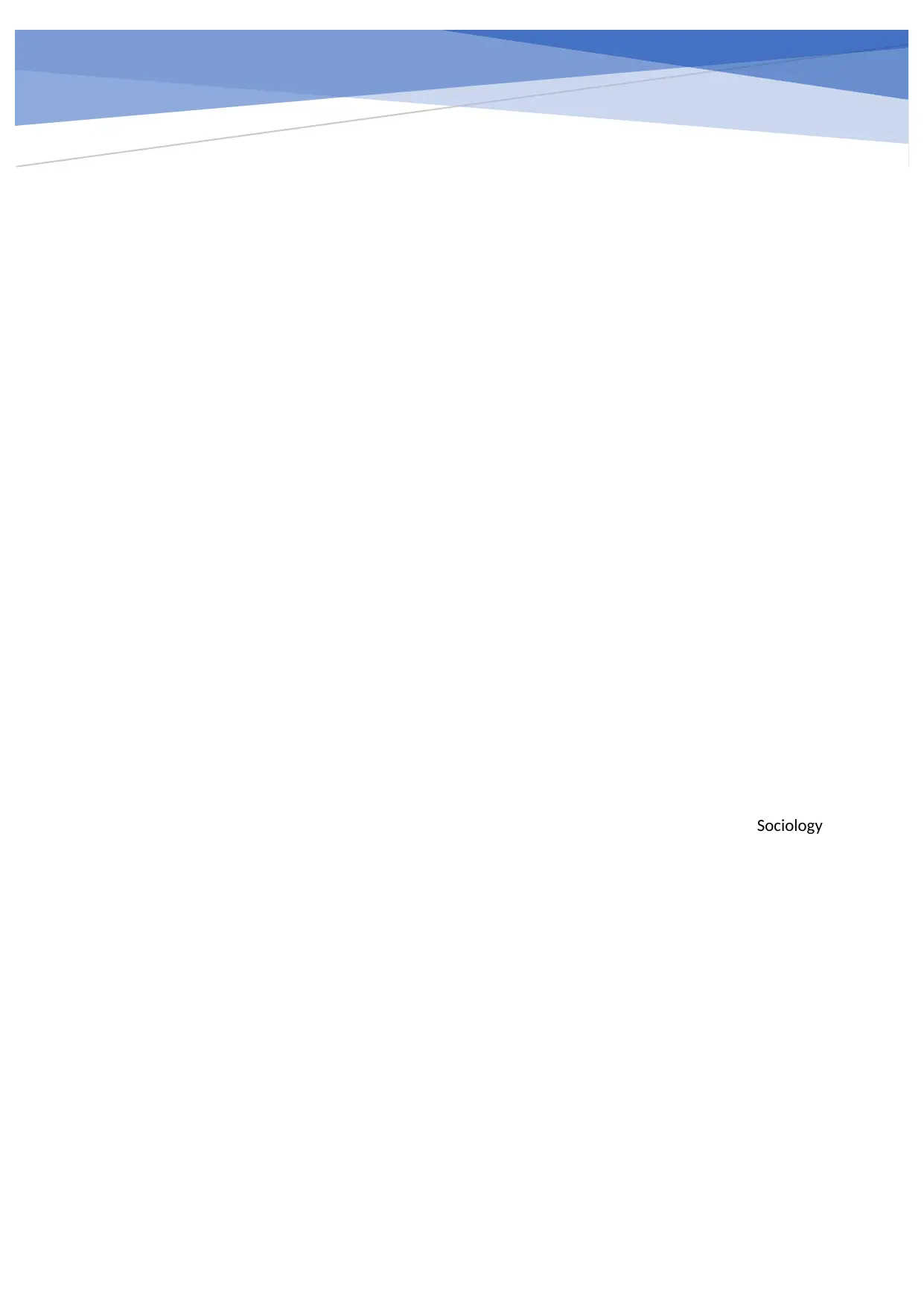
Sociology
Paraphrase This Document
Need a fresh take? Get an instant paraphrase of this document with our AI Paraphraser
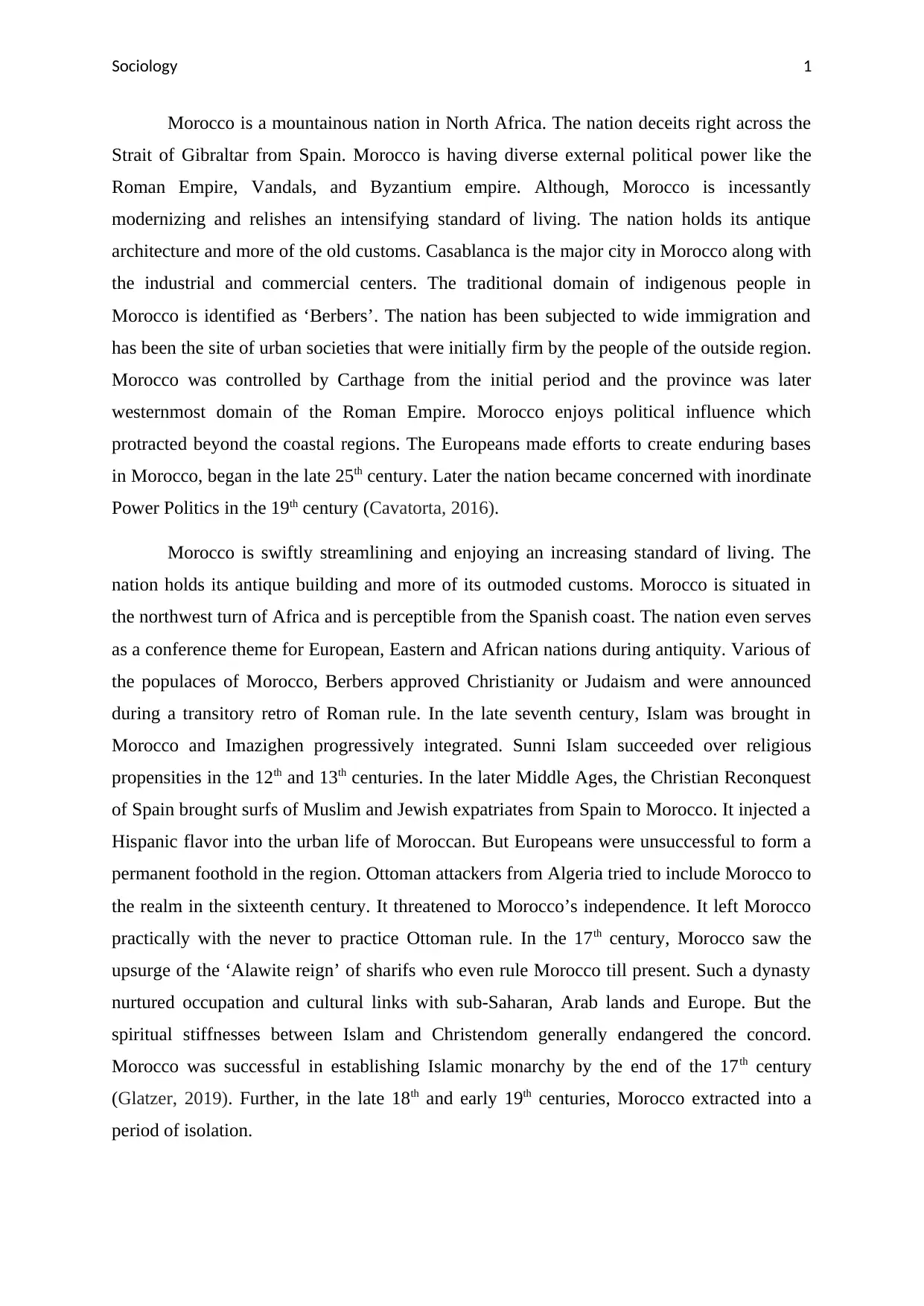
Sociology 1
Morocco is a mountainous nation in North Africa. The nation deceits right across the
Strait of Gibraltar from Spain. Morocco is having diverse external political power like the
Roman Empire, Vandals, and Byzantium empire. Although, Morocco is incessantly
modernizing and relishes an intensifying standard of living. The nation holds its antique
architecture and more of the old customs. Casablanca is the major city in Morocco along with
the industrial and commercial centers. The traditional domain of indigenous people in
Morocco is identified as ‘Berbers’. The nation has been subjected to wide immigration and
has been the site of urban societies that were initially firm by the people of the outside region.
Morocco was controlled by Carthage from the initial period and the province was later
westernmost domain of the Roman Empire. Morocco enjoys political influence which
protracted beyond the coastal regions. The Europeans made efforts to create enduring bases
in Morocco, began in the late 25th century. Later the nation became concerned with inordinate
Power Politics in the 19th century (Cavatorta, 2016).
Morocco is swiftly streamlining and enjoying an increasing standard of living. The
nation holds its antique building and more of its outmoded customs. Morocco is situated in
the northwest turn of Africa and is perceptible from the Spanish coast. The nation even serves
as a conference theme for European, Eastern and African nations during antiquity. Various of
the populaces of Morocco, Berbers approved Christianity or Judaism and were announced
during a transitory retro of Roman rule. In the late seventh century, Islam was brought in
Morocco and Imazighen progressively integrated. Sunni Islam succeeded over religious
propensities in the 12th and 13th centuries. In the later Middle Ages, the Christian Reconquest
of Spain brought surfs of Muslim and Jewish expatriates from Spain to Morocco. It injected a
Hispanic flavor into the urban life of Moroccan. But Europeans were unsuccessful to form a
permanent foothold in the region. Ottoman attackers from Algeria tried to include Morocco to
the realm in the sixteenth century. It threatened to Morocco’s independence. It left Morocco
practically with the never to practice Ottoman rule. In the 17th century, Morocco saw the
upsurge of the ‘Alawite reign’ of sharifs who even rule Morocco till present. Such a dynasty
nurtured occupation and cultural links with sub-Saharan, Arab lands and Europe. But the
spiritual stiffnesses between Islam and Christendom generally endangered the concord.
Morocco was successful in establishing Islamic monarchy by the end of the 17th century
(Glatzer, 2019). Further, in the late 18th and early 19th centuries, Morocco extracted into a
period of isolation.
Morocco is a mountainous nation in North Africa. The nation deceits right across the
Strait of Gibraltar from Spain. Morocco is having diverse external political power like the
Roman Empire, Vandals, and Byzantium empire. Although, Morocco is incessantly
modernizing and relishes an intensifying standard of living. The nation holds its antique
architecture and more of the old customs. Casablanca is the major city in Morocco along with
the industrial and commercial centers. The traditional domain of indigenous people in
Morocco is identified as ‘Berbers’. The nation has been subjected to wide immigration and
has been the site of urban societies that were initially firm by the people of the outside region.
Morocco was controlled by Carthage from the initial period and the province was later
westernmost domain of the Roman Empire. Morocco enjoys political influence which
protracted beyond the coastal regions. The Europeans made efforts to create enduring bases
in Morocco, began in the late 25th century. Later the nation became concerned with inordinate
Power Politics in the 19th century (Cavatorta, 2016).
Morocco is swiftly streamlining and enjoying an increasing standard of living. The
nation holds its antique building and more of its outmoded customs. Morocco is situated in
the northwest turn of Africa and is perceptible from the Spanish coast. The nation even serves
as a conference theme for European, Eastern and African nations during antiquity. Various of
the populaces of Morocco, Berbers approved Christianity or Judaism and were announced
during a transitory retro of Roman rule. In the late seventh century, Islam was brought in
Morocco and Imazighen progressively integrated. Sunni Islam succeeded over religious
propensities in the 12th and 13th centuries. In the later Middle Ages, the Christian Reconquest
of Spain brought surfs of Muslim and Jewish expatriates from Spain to Morocco. It injected a
Hispanic flavor into the urban life of Moroccan. But Europeans were unsuccessful to form a
permanent foothold in the region. Ottoman attackers from Algeria tried to include Morocco to
the realm in the sixteenth century. It threatened to Morocco’s independence. It left Morocco
practically with the never to practice Ottoman rule. In the 17th century, Morocco saw the
upsurge of the ‘Alawite reign’ of sharifs who even rule Morocco till present. Such a dynasty
nurtured occupation and cultural links with sub-Saharan, Arab lands and Europe. But the
spiritual stiffnesses between Islam and Christendom generally endangered the concord.
Morocco was successful in establishing Islamic monarchy by the end of the 17th century
(Glatzer, 2019). Further, in the late 18th and early 19th centuries, Morocco extracted into a
period of isolation.
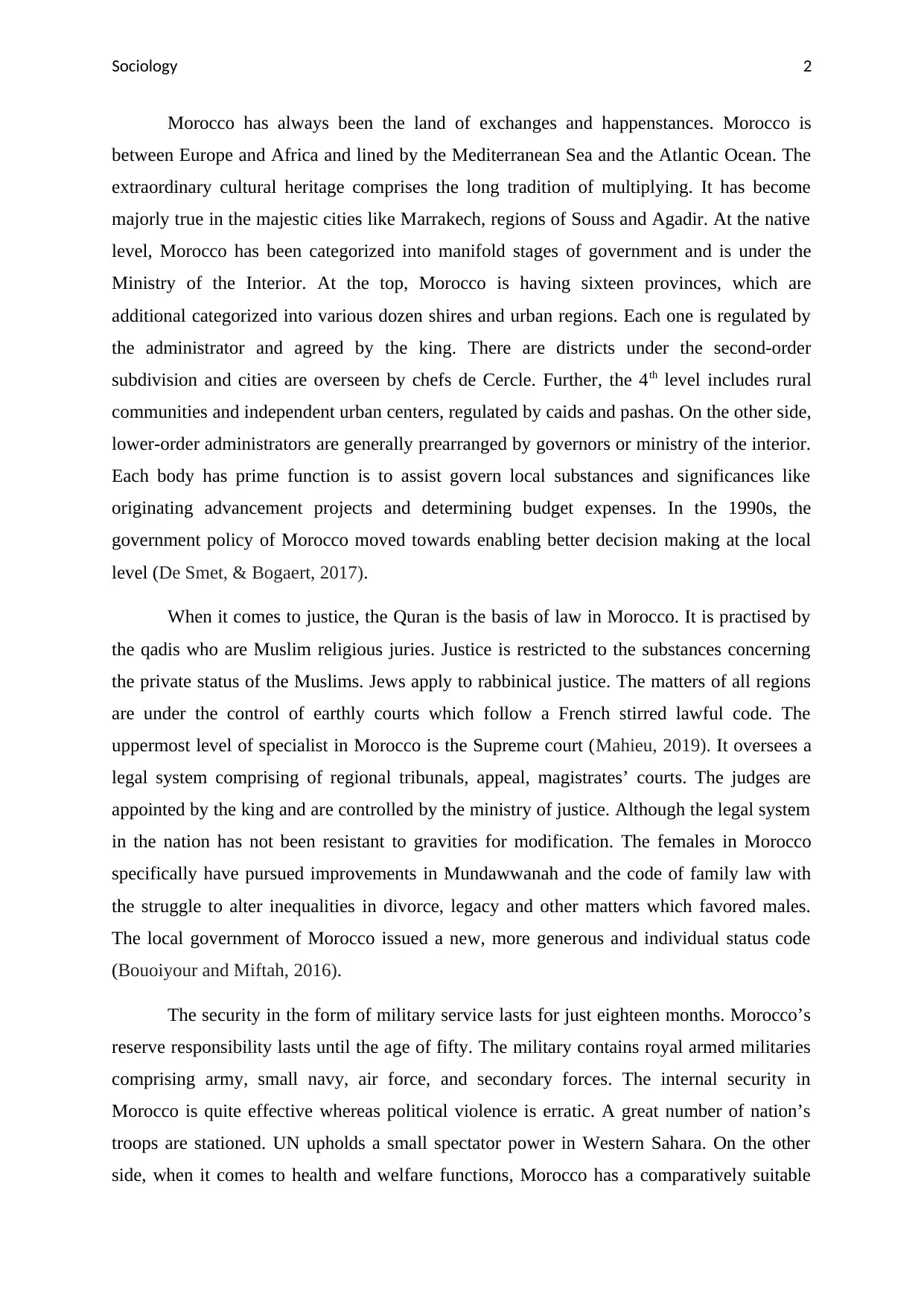
Sociology 2
Morocco has always been the land of exchanges and happenstances. Morocco is
between Europe and Africa and lined by the Mediterranean Sea and the Atlantic Ocean. The
extraordinary cultural heritage comprises the long tradition of multiplying. It has become
majorly true in the majestic cities like Marrakech, regions of Souss and Agadir. At the native
level, Morocco has been categorized into manifold stages of government and is under the
Ministry of the Interior. At the top, Morocco is having sixteen provinces, which are
additional categorized into various dozen shires and urban regions. Each one is regulated by
the administrator and agreed by the king. There are districts under the second-order
subdivision and cities are overseen by chefs de Cercle. Further, the 4th level includes rural
communities and independent urban centers, regulated by caids and pashas. On the other side,
lower-order administrators are generally prearranged by governors or ministry of the interior.
Each body has prime function is to assist govern local substances and significances like
originating advancement projects and determining budget expenses. In the 1990s, the
government policy of Morocco moved towards enabling better decision making at the local
level (De Smet, & Bogaert, 2017).
When it comes to justice, the Quran is the basis of law in Morocco. It is practised by
the qadis who are Muslim religious juries. Justice is restricted to the substances concerning
the private status of the Muslims. Jews apply to rabbinical justice. The matters of all regions
are under the control of earthly courts which follow a French stirred lawful code. The
uppermost level of specialist in Morocco is the Supreme court (Mahieu, 2019). It oversees a
legal system comprising of regional tribunals, appeal, magistrates’ courts. The judges are
appointed by the king and are controlled by the ministry of justice. Although the legal system
in the nation has not been resistant to gravities for modification. The females in Morocco
specifically have pursued improvements in Mundawwanah and the code of family law with
the struggle to alter inequalities in divorce, legacy and other matters which favored males.
The local government of Morocco issued a new, more generous and individual status code
(Bouoiyour and Miftah, 2016).
The security in the form of military service lasts for just eighteen months. Morocco’s
reserve responsibility lasts until the age of fifty. The military contains royal armed militaries
comprising army, small navy, air force, and secondary forces. The internal security in
Morocco is quite effective whereas political violence is erratic. A great number of nation’s
troops are stationed. UN upholds a small spectator power in Western Sahara. On the other
side, when it comes to health and welfare functions, Morocco has a comparatively suitable
Morocco has always been the land of exchanges and happenstances. Morocco is
between Europe and Africa and lined by the Mediterranean Sea and the Atlantic Ocean. The
extraordinary cultural heritage comprises the long tradition of multiplying. It has become
majorly true in the majestic cities like Marrakech, regions of Souss and Agadir. At the native
level, Morocco has been categorized into manifold stages of government and is under the
Ministry of the Interior. At the top, Morocco is having sixteen provinces, which are
additional categorized into various dozen shires and urban regions. Each one is regulated by
the administrator and agreed by the king. There are districts under the second-order
subdivision and cities are overseen by chefs de Cercle. Further, the 4th level includes rural
communities and independent urban centers, regulated by caids and pashas. On the other side,
lower-order administrators are generally prearranged by governors or ministry of the interior.
Each body has prime function is to assist govern local substances and significances like
originating advancement projects and determining budget expenses. In the 1990s, the
government policy of Morocco moved towards enabling better decision making at the local
level (De Smet, & Bogaert, 2017).
When it comes to justice, the Quran is the basis of law in Morocco. It is practised by
the qadis who are Muslim religious juries. Justice is restricted to the substances concerning
the private status of the Muslims. Jews apply to rabbinical justice. The matters of all regions
are under the control of earthly courts which follow a French stirred lawful code. The
uppermost level of specialist in Morocco is the Supreme court (Mahieu, 2019). It oversees a
legal system comprising of regional tribunals, appeal, magistrates’ courts. The judges are
appointed by the king and are controlled by the ministry of justice. Although the legal system
in the nation has not been resistant to gravities for modification. The females in Morocco
specifically have pursued improvements in Mundawwanah and the code of family law with
the struggle to alter inequalities in divorce, legacy and other matters which favored males.
The local government of Morocco issued a new, more generous and individual status code
(Bouoiyour and Miftah, 2016).
The security in the form of military service lasts for just eighteen months. Morocco’s
reserve responsibility lasts until the age of fifty. The military contains royal armed militaries
comprising army, small navy, air force, and secondary forces. The internal security in
Morocco is quite effective whereas political violence is erratic. A great number of nation’s
troops are stationed. UN upholds a small spectator power in Western Sahara. On the other
side, when it comes to health and welfare functions, Morocco has a comparatively suitable
⊘ This is a preview!⊘
Do you want full access?
Subscribe today to unlock all pages.

Trusted by 1+ million students worldwide
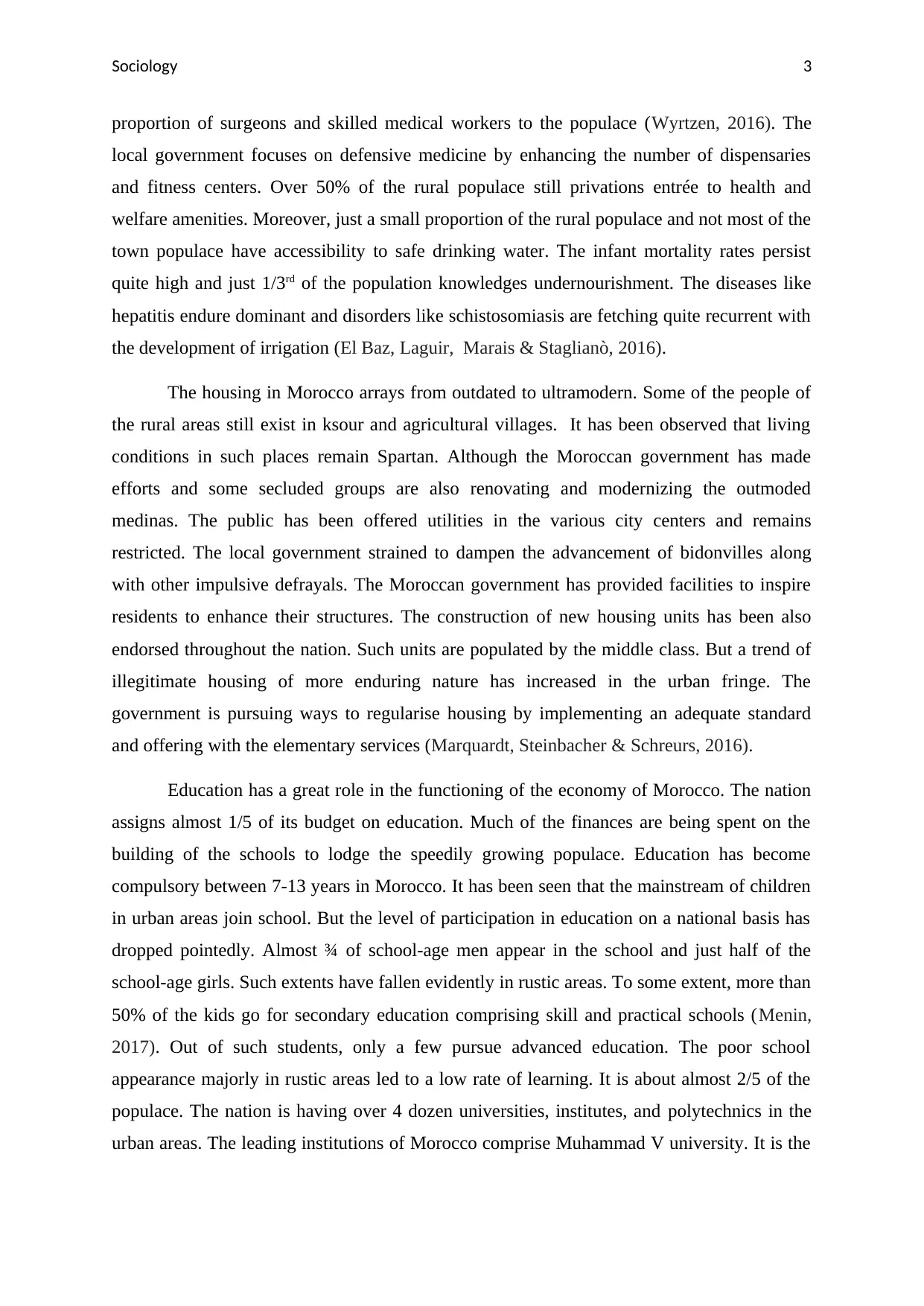
Sociology 3
proportion of surgeons and skilled medical workers to the populace (Wyrtzen, 2016). The
local government focuses on defensive medicine by enhancing the number of dispensaries
and fitness centers. Over 50% of the rural populace still privations entrée to health and
welfare amenities. Moreover, just a small proportion of the rural populace and not most of the
town populace have accessibility to safe drinking water. The infant mortality rates persist
quite high and just 1/3rd of the population knowledges undernourishment. The diseases like
hepatitis endure dominant and disorders like schistosomiasis are fetching quite recurrent with
the development of irrigation (El Baz, Laguir, Marais & Staglianò, 2016).
The housing in Morocco arrays from outdated to ultramodern. Some of the people of
the rural areas still exist in ksour and agricultural villages. It has been observed that living
conditions in such places remain Spartan. Although the Moroccan government has made
efforts and some secluded groups are also renovating and modernizing the outmoded
medinas. The public has been offered utilities in the various city centers and remains
restricted. The local government strained to dampen the advancement of bidonvilles along
with other impulsive defrayals. The Moroccan government has provided facilities to inspire
residents to enhance their structures. The construction of new housing units has been also
endorsed throughout the nation. Such units are populated by the middle class. But a trend of
illegitimate housing of more enduring nature has increased in the urban fringe. The
government is pursuing ways to regularise housing by implementing an adequate standard
and offering with the elementary services (Marquardt, Steinbacher & Schreurs, 2016).
Education has a great role in the functioning of the economy of Morocco. The nation
assigns almost 1/5 of its budget on education. Much of the finances are being spent on the
building of the schools to lodge the speedily growing populace. Education has become
compulsory between 7-13 years in Morocco. It has been seen that the mainstream of children
in urban areas join school. But the level of participation in education on a national basis has
dropped pointedly. Almost ¾ of school-age men appear in the school and just half of the
school-age girls. Such extents have fallen evidently in rustic areas. To some extent, more than
50% of the kids go for secondary education comprising skill and practical schools (Menin,
2017). Out of such students, only a few pursue advanced education. The poor school
appearance majorly in rustic areas led to a low rate of learning. It is about almost 2/5 of the
populace. The nation is having over 4 dozen universities, institutes, and polytechnics in the
urban areas. The leading institutions of Morocco comprise Muhammad V university. It is the
proportion of surgeons and skilled medical workers to the populace (Wyrtzen, 2016). The
local government focuses on defensive medicine by enhancing the number of dispensaries
and fitness centers. Over 50% of the rural populace still privations entrée to health and
welfare amenities. Moreover, just a small proportion of the rural populace and not most of the
town populace have accessibility to safe drinking water. The infant mortality rates persist
quite high and just 1/3rd of the population knowledges undernourishment. The diseases like
hepatitis endure dominant and disorders like schistosomiasis are fetching quite recurrent with
the development of irrigation (El Baz, Laguir, Marais & Staglianò, 2016).
The housing in Morocco arrays from outdated to ultramodern. Some of the people of
the rural areas still exist in ksour and agricultural villages. It has been observed that living
conditions in such places remain Spartan. Although the Moroccan government has made
efforts and some secluded groups are also renovating and modernizing the outmoded
medinas. The public has been offered utilities in the various city centers and remains
restricted. The local government strained to dampen the advancement of bidonvilles along
with other impulsive defrayals. The Moroccan government has provided facilities to inspire
residents to enhance their structures. The construction of new housing units has been also
endorsed throughout the nation. Such units are populated by the middle class. But a trend of
illegitimate housing of more enduring nature has increased in the urban fringe. The
government is pursuing ways to regularise housing by implementing an adequate standard
and offering with the elementary services (Marquardt, Steinbacher & Schreurs, 2016).
Education has a great role in the functioning of the economy of Morocco. The nation
assigns almost 1/5 of its budget on education. Much of the finances are being spent on the
building of the schools to lodge the speedily growing populace. Education has become
compulsory between 7-13 years in Morocco. It has been seen that the mainstream of children
in urban areas join school. But the level of participation in education on a national basis has
dropped pointedly. Almost ¾ of school-age men appear in the school and just half of the
school-age girls. Such extents have fallen evidently in rustic areas. To some extent, more than
50% of the kids go for secondary education comprising skill and practical schools (Menin,
2017). Out of such students, only a few pursue advanced education. The poor school
appearance majorly in rustic areas led to a low rate of learning. It is about almost 2/5 of the
populace. The nation is having over 4 dozen universities, institutes, and polytechnics in the
urban areas. The leading institutions of Morocco comprise Muhammad V university. It is the
Paraphrase This Document
Need a fresh take? Get an instant paraphrase of this document with our AI Paraphraser
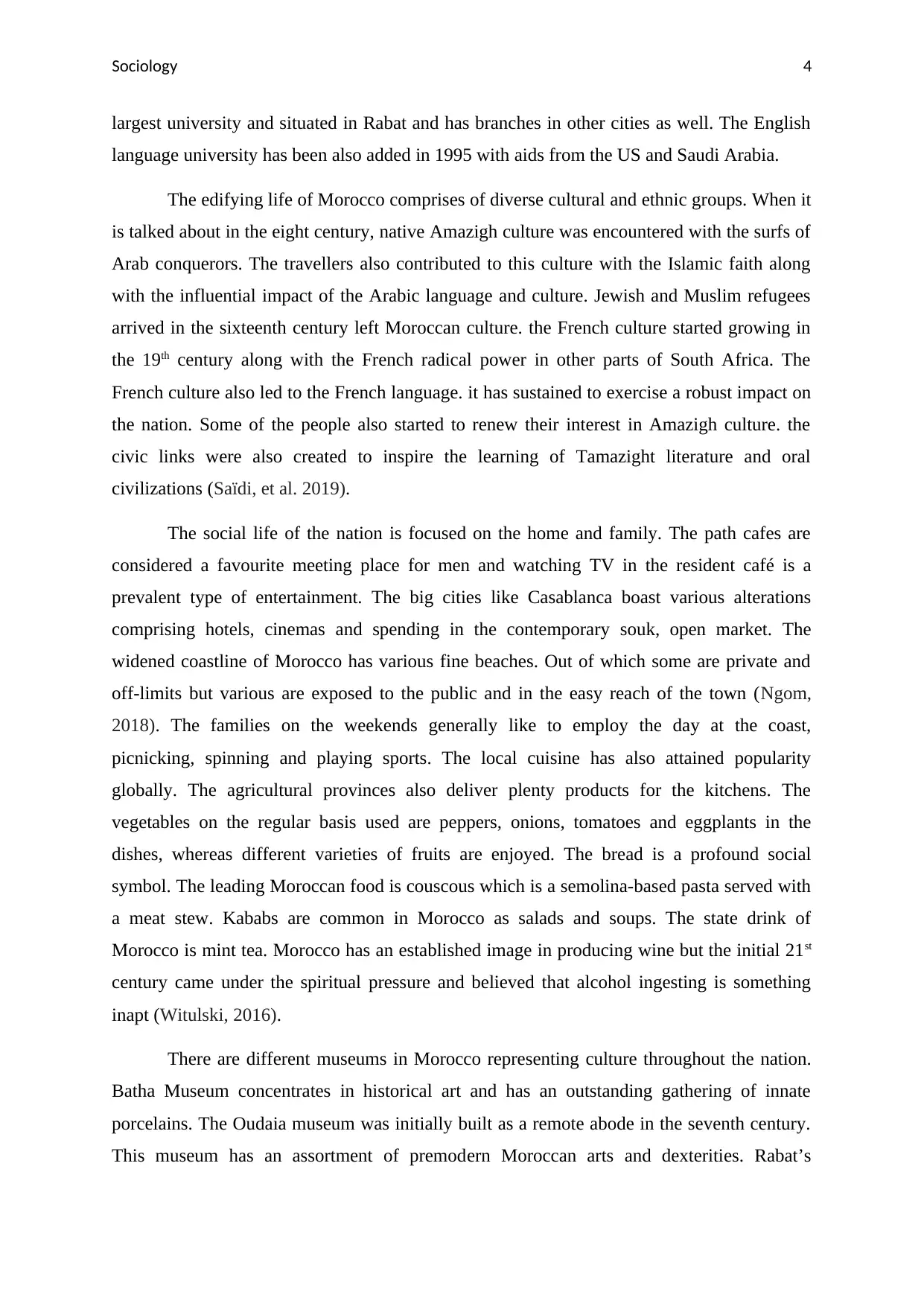
Sociology 4
largest university and situated in Rabat and has branches in other cities as well. The English
language university has been also added in 1995 with aids from the US and Saudi Arabia.
The edifying life of Morocco comprises of diverse cultural and ethnic groups. When it
is talked about in the eight century, native Amazigh culture was encountered with the surfs of
Arab conquerors. The travellers also contributed to this culture with the Islamic faith along
with the influential impact of the Arabic language and culture. Jewish and Muslim refugees
arrived in the sixteenth century left Moroccan culture. the French culture started growing in
the 19th century along with the French radical power in other parts of South Africa. The
French culture also led to the French language. it has sustained to exercise a robust impact on
the nation. Some of the people also started to renew their interest in Amazigh culture. the
civic links were also created to inspire the learning of Tamazight literature and oral
civilizations (Saïdi, et al. 2019).
The social life of the nation is focused on the home and family. The path cafes are
considered a favourite meeting place for men and watching TV in the resident café is a
prevalent type of entertainment. The big cities like Casablanca boast various alterations
comprising hotels, cinemas and spending in the contemporary souk, open market. The
widened coastline of Morocco has various fine beaches. Out of which some are private and
off-limits but various are exposed to the public and in the easy reach of the town (Ngom,
2018). The families on the weekends generally like to employ the day at the coast,
picnicking, spinning and playing sports. The local cuisine has also attained popularity
globally. The agricultural provinces also deliver plenty products for the kitchens. The
vegetables on the regular basis used are peppers, onions, tomatoes and eggplants in the
dishes, whereas different varieties of fruits are enjoyed. The bread is a profound social
symbol. The leading Moroccan food is couscous which is a semolina-based pasta served with
a meat stew. Kababs are common in Morocco as salads and soups. The state drink of
Morocco is mint tea. Morocco has an established image in producing wine but the initial 21st
century came under the spiritual pressure and believed that alcohol ingesting is something
inapt (Witulski, 2016).
There are different museums in Morocco representing culture throughout the nation.
Batha Museum concentrates in historical art and has an outstanding gathering of innate
porcelains. The Oudaia museum was initially built as a remote abode in the seventh century.
This museum has an assortment of premodern Moroccan arts and dexterities. Rabat’s
largest university and situated in Rabat and has branches in other cities as well. The English
language university has been also added in 1995 with aids from the US and Saudi Arabia.
The edifying life of Morocco comprises of diverse cultural and ethnic groups. When it
is talked about in the eight century, native Amazigh culture was encountered with the surfs of
Arab conquerors. The travellers also contributed to this culture with the Islamic faith along
with the influential impact of the Arabic language and culture. Jewish and Muslim refugees
arrived in the sixteenth century left Moroccan culture. the French culture started growing in
the 19th century along with the French radical power in other parts of South Africa. The
French culture also led to the French language. it has sustained to exercise a robust impact on
the nation. Some of the people also started to renew their interest in Amazigh culture. the
civic links were also created to inspire the learning of Tamazight literature and oral
civilizations (Saïdi, et al. 2019).
The social life of the nation is focused on the home and family. The path cafes are
considered a favourite meeting place for men and watching TV in the resident café is a
prevalent type of entertainment. The big cities like Casablanca boast various alterations
comprising hotels, cinemas and spending in the contemporary souk, open market. The
widened coastline of Morocco has various fine beaches. Out of which some are private and
off-limits but various are exposed to the public and in the easy reach of the town (Ngom,
2018). The families on the weekends generally like to employ the day at the coast,
picnicking, spinning and playing sports. The local cuisine has also attained popularity
globally. The agricultural provinces also deliver plenty products for the kitchens. The
vegetables on the regular basis used are peppers, onions, tomatoes and eggplants in the
dishes, whereas different varieties of fruits are enjoyed. The bread is a profound social
symbol. The leading Moroccan food is couscous which is a semolina-based pasta served with
a meat stew. Kababs are common in Morocco as salads and soups. The state drink of
Morocco is mint tea. Morocco has an established image in producing wine but the initial 21st
century came under the spiritual pressure and believed that alcohol ingesting is something
inapt (Witulski, 2016).
There are different museums in Morocco representing culture throughout the nation.
Batha Museum concentrates in historical art and has an outstanding gathering of innate
porcelains. The Oudaia museum was initially built as a remote abode in the seventh century.
This museum has an assortment of premodern Moroccan arts and dexterities. Rabat’s
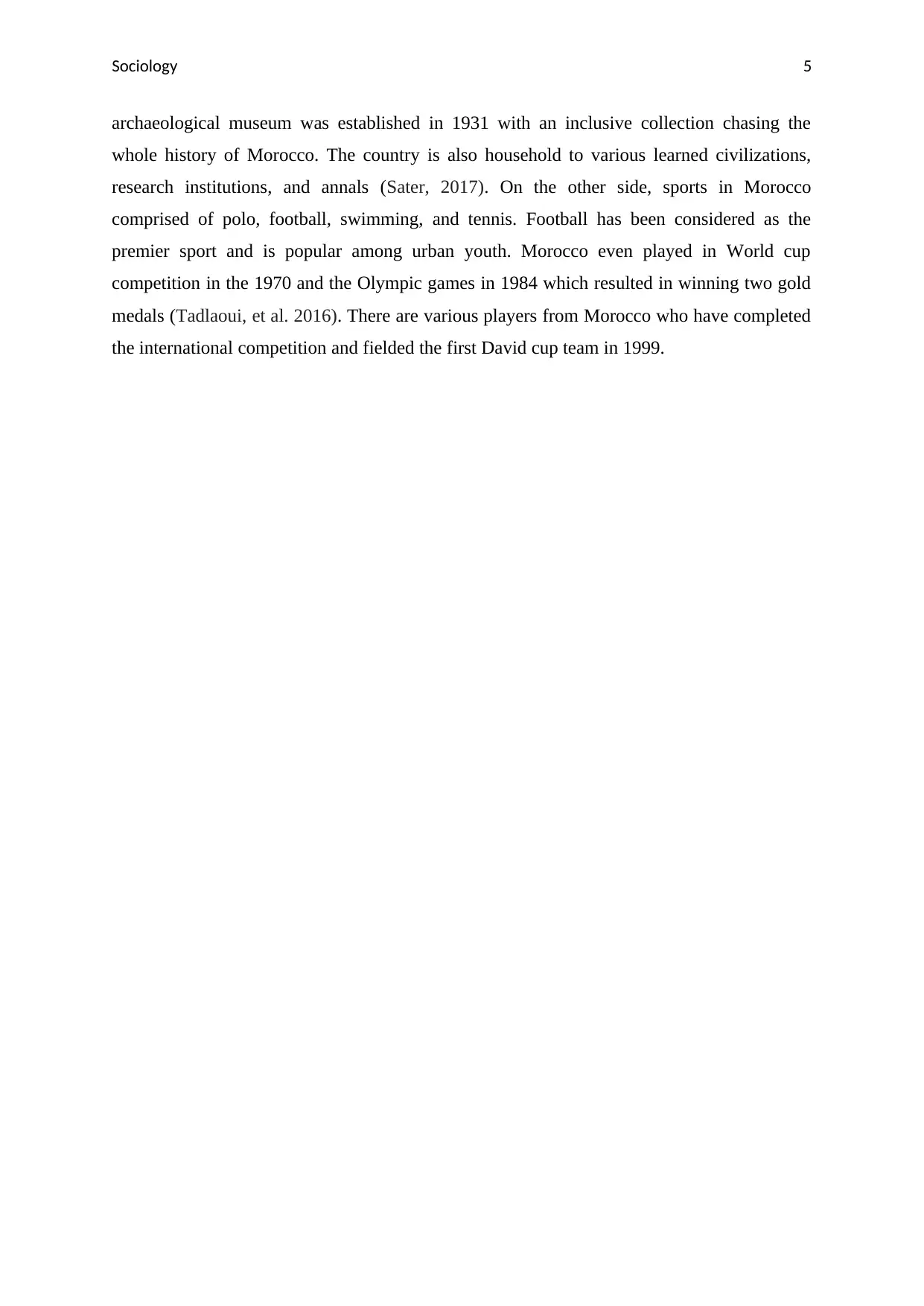
Sociology 5
archaeological museum was established in 1931 with an inclusive collection chasing the
whole history of Morocco. The country is also household to various learned civilizations,
research institutions, and annals (Sater, 2017). On the other side, sports in Morocco
comprised of polo, football, swimming, and tennis. Football has been considered as the
premier sport and is popular among urban youth. Morocco even played in World cup
competition in the 1970 and the Olympic games in 1984 which resulted in winning two gold
medals (Tadlaoui, et al. 2016). There are various players from Morocco who have completed
the international competition and fielded the first David cup team in 1999.
archaeological museum was established in 1931 with an inclusive collection chasing the
whole history of Morocco. The country is also household to various learned civilizations,
research institutions, and annals (Sater, 2017). On the other side, sports in Morocco
comprised of polo, football, swimming, and tennis. Football has been considered as the
premier sport and is popular among urban youth. Morocco even played in World cup
competition in the 1970 and the Olympic games in 1984 which resulted in winning two gold
medals (Tadlaoui, et al. 2016). There are various players from Morocco who have completed
the international competition and fielded the first David cup team in 1999.
⊘ This is a preview!⊘
Do you want full access?
Subscribe today to unlock all pages.

Trusted by 1+ million students worldwide
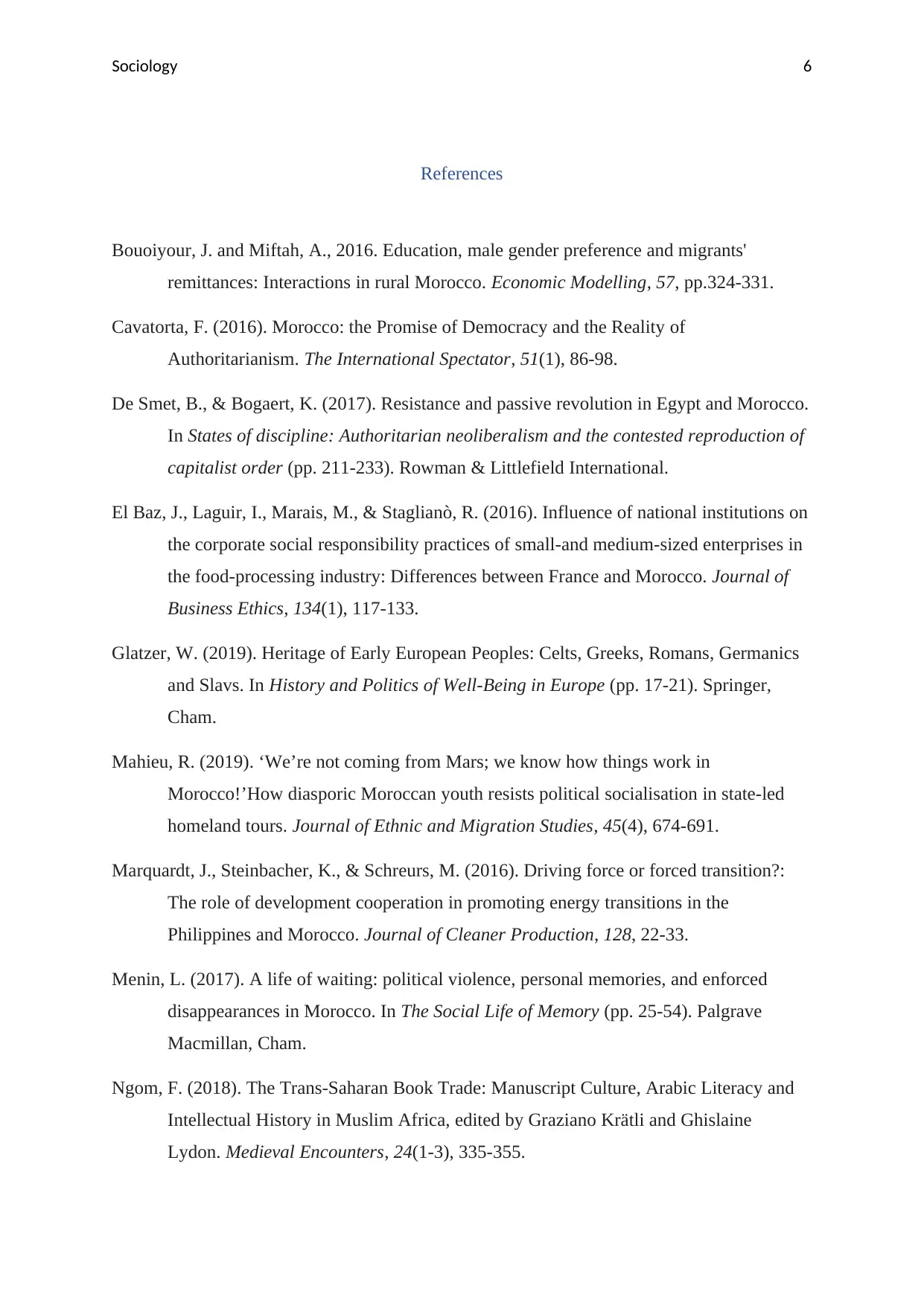
Sociology 6
References
Bouoiyour, J. and Miftah, A., 2016. Education, male gender preference and migrants'
remittances: Interactions in rural Morocco. Economic Modelling, 57, pp.324-331.
Cavatorta, F. (2016). Morocco: the Promise of Democracy and the Reality of
Authoritarianism. The International Spectator, 51(1), 86-98.
De Smet, B., & Bogaert, K. (2017). Resistance and passive revolution in Egypt and Morocco.
In States of discipline: Authoritarian neoliberalism and the contested reproduction of
capitalist order (pp. 211-233). Rowman & Littlefield International.
El Baz, J., Laguir, I., Marais, M., & Staglianò, R. (2016). Influence of national institutions on
the corporate social responsibility practices of small-and medium-sized enterprises in
the food-processing industry: Differences between France and Morocco. Journal of
Business Ethics, 134(1), 117-133.
Glatzer, W. (2019). Heritage of Early European Peoples: Celts, Greeks, Romans, Germanics
and Slavs. In History and Politics of Well-Being in Europe (pp. 17-21). Springer,
Cham.
Mahieu, R. (2019). ‘We’re not coming from Mars; we know how things work in
Morocco!’How diasporic Moroccan youth resists political socialisation in state-led
homeland tours. Journal of Ethnic and Migration Studies, 45(4), 674-691.
Marquardt, J., Steinbacher, K., & Schreurs, M. (2016). Driving force or forced transition?:
The role of development cooperation in promoting energy transitions in the
Philippines and Morocco. Journal of Cleaner Production, 128, 22-33.
Menin, L. (2017). A life of waiting: political violence, personal memories, and enforced
disappearances in Morocco. In The Social Life of Memory (pp. 25-54). Palgrave
Macmillan, Cham.
Ngom, F. (2018). The Trans-Saharan Book Trade: Manuscript Culture, Arabic Literacy and
Intellectual History in Muslim Africa, edited by Graziano Krätli and Ghislaine
Lydon. Medieval Encounters, 24(1-3), 335-355.
References
Bouoiyour, J. and Miftah, A., 2016. Education, male gender preference and migrants'
remittances: Interactions in rural Morocco. Economic Modelling, 57, pp.324-331.
Cavatorta, F. (2016). Morocco: the Promise of Democracy and the Reality of
Authoritarianism. The International Spectator, 51(1), 86-98.
De Smet, B., & Bogaert, K. (2017). Resistance and passive revolution in Egypt and Morocco.
In States of discipline: Authoritarian neoliberalism and the contested reproduction of
capitalist order (pp. 211-233). Rowman & Littlefield International.
El Baz, J., Laguir, I., Marais, M., & Staglianò, R. (2016). Influence of national institutions on
the corporate social responsibility practices of small-and medium-sized enterprises in
the food-processing industry: Differences between France and Morocco. Journal of
Business Ethics, 134(1), 117-133.
Glatzer, W. (2019). Heritage of Early European Peoples: Celts, Greeks, Romans, Germanics
and Slavs. In History and Politics of Well-Being in Europe (pp. 17-21). Springer,
Cham.
Mahieu, R. (2019). ‘We’re not coming from Mars; we know how things work in
Morocco!’How diasporic Moroccan youth resists political socialisation in state-led
homeland tours. Journal of Ethnic and Migration Studies, 45(4), 674-691.
Marquardt, J., Steinbacher, K., & Schreurs, M. (2016). Driving force or forced transition?:
The role of development cooperation in promoting energy transitions in the
Philippines and Morocco. Journal of Cleaner Production, 128, 22-33.
Menin, L. (2017). A life of waiting: political violence, personal memories, and enforced
disappearances in Morocco. In The Social Life of Memory (pp. 25-54). Palgrave
Macmillan, Cham.
Ngom, F. (2018). The Trans-Saharan Book Trade: Manuscript Culture, Arabic Literacy and
Intellectual History in Muslim Africa, edited by Graziano Krätli and Ghislaine
Lydon. Medieval Encounters, 24(1-3), 335-355.
Paraphrase This Document
Need a fresh take? Get an instant paraphrase of this document with our AI Paraphraser
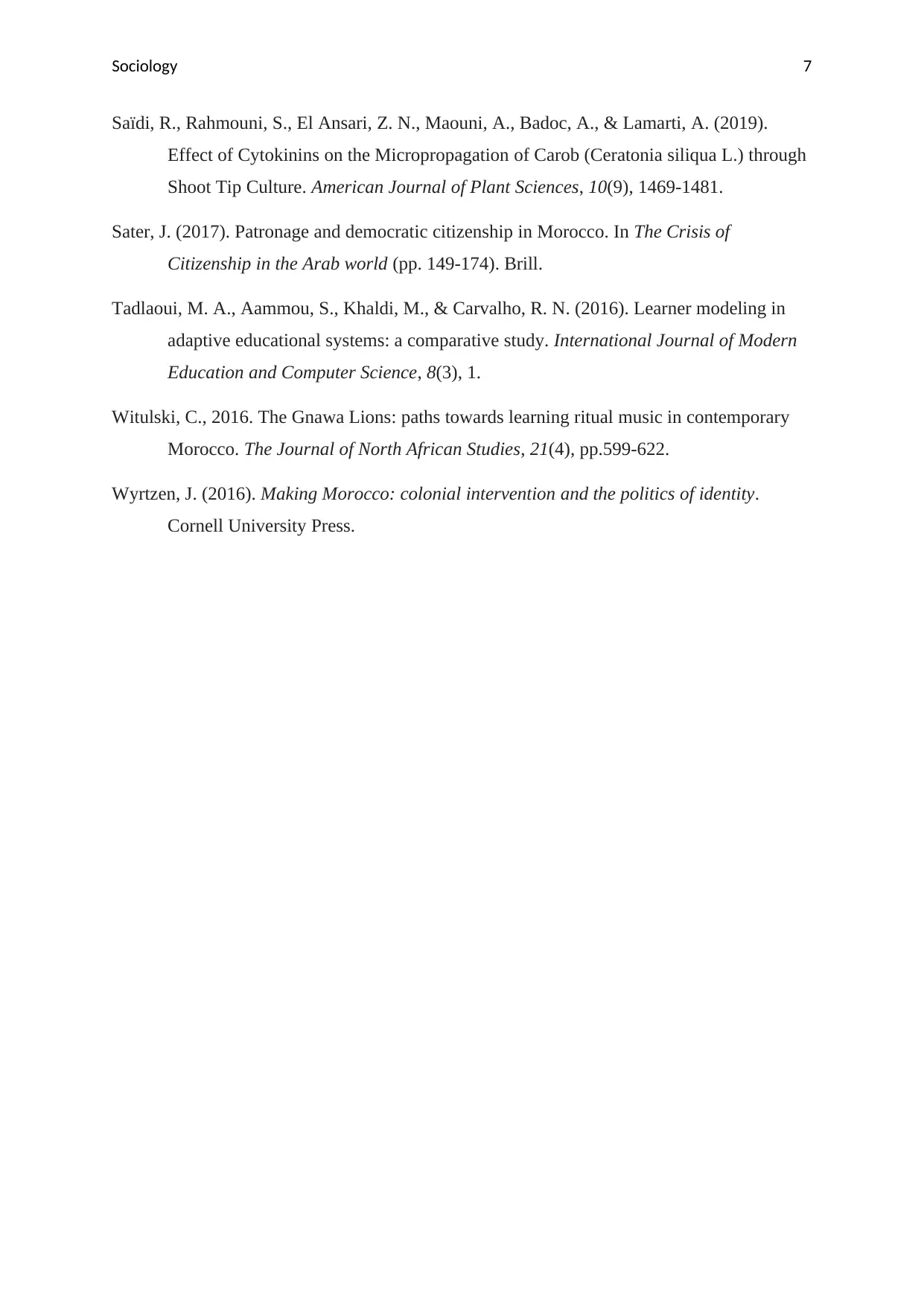
Sociology 7
Saïdi, R., Rahmouni, S., El Ansari, Z. N., Maouni, A., Badoc, A., & Lamarti, A. (2019).
Effect of Cytokinins on the Micropropagation of Carob (Ceratonia siliqua L.) through
Shoot Tip Culture. American Journal of Plant Sciences, 10(9), 1469-1481.
Sater, J. (2017). Patronage and democratic citizenship in Morocco. In The Crisis of
Citizenship in the Arab world (pp. 149-174). Brill.
Tadlaoui, M. A., Aammou, S., Khaldi, M., & Carvalho, R. N. (2016). Learner modeling in
adaptive educational systems: a comparative study. International Journal of Modern
Education and Computer Science, 8(3), 1.
Witulski, C., 2016. The Gnawa Lions: paths towards learning ritual music in contemporary
Morocco. The Journal of North African Studies, 21(4), pp.599-622.
Wyrtzen, J. (2016). Making Morocco: colonial intervention and the politics of identity.
Cornell University Press.
Saïdi, R., Rahmouni, S., El Ansari, Z. N., Maouni, A., Badoc, A., & Lamarti, A. (2019).
Effect of Cytokinins on the Micropropagation of Carob (Ceratonia siliqua L.) through
Shoot Tip Culture. American Journal of Plant Sciences, 10(9), 1469-1481.
Sater, J. (2017). Patronage and democratic citizenship in Morocco. In The Crisis of
Citizenship in the Arab world (pp. 149-174). Brill.
Tadlaoui, M. A., Aammou, S., Khaldi, M., & Carvalho, R. N. (2016). Learner modeling in
adaptive educational systems: a comparative study. International Journal of Modern
Education and Computer Science, 8(3), 1.
Witulski, C., 2016. The Gnawa Lions: paths towards learning ritual music in contemporary
Morocco. The Journal of North African Studies, 21(4), pp.599-622.
Wyrtzen, J. (2016). Making Morocco: colonial intervention and the politics of identity.
Cornell University Press.
1 out of 8
Your All-in-One AI-Powered Toolkit for Academic Success.
+13062052269
info@desklib.com
Available 24*7 on WhatsApp / Email
![[object Object]](/_next/static/media/star-bottom.7253800d.svg)
Unlock your academic potential
Copyright © 2020–2026 A2Z Services. All Rights Reserved. Developed and managed by ZUCOL.


